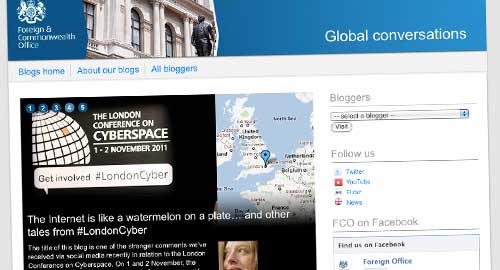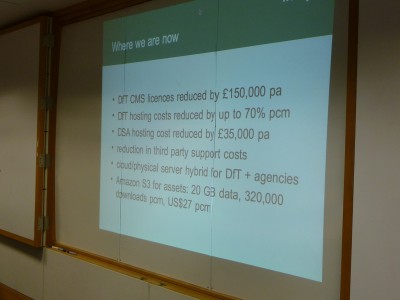Even a few days after their initial publication, I’m still slightly stunned to read the comments of Puffbox’s best pal Chris Chant, now back in his role as Programme Director for the G-Cloud initiative, at the Institute for Government earlier this month.
It is unacceptable at this point in time to not know the true cost of a service and the real exit costs from those services: the costs commercially, technically and from a business de-integration standpoint. So, how do we untangle our way out of a particular product or service. I can’t tell you how many times I’ve had the discussion that says, we need to get away from that, and we can’t because of the complexity of getting out from where we are, and of all the things that are hanging on to that particular service, that we can’t disentangle ourselves from.
I think it’s completely unacceptable at this point in time to enter into contracts for longer than 12 months. I can’t see how we can sit in a world of IT, and acknowledge the arrival of the iPad in the last two years, and yet somehow imagine that we can predict what we’re going to need to be doing in two or three or five or seven or ten years time. It’s complete nonsense.
[…]
I think it’s unacceptable, not to know how many staff that we have in government working on the client side of IT. I’ve not yet met anybody who knows what that figure is. People know about small areas, but overall, we don’t know what that figure is.
And equally, it’s unacceptable that we don’t know what those people do. So we don’t have any idea of the breakdown of that number that we don’t know either, surprisingly, and I think that’s outrageous in this climate – and actually, in any climate.
It’s completely unacceptable not to know what systems we own, how much they cost and how much or even if they are used. I know there are organisations that have turned off tens of thousands of desktop services, merely to discover if they’re used any more. And when they do that, they discover maybe 1% of those are still being used. That’s completely unacceptable.
It’s unacceptable not to know when users give up on an online service. And it is unacceptable not to know why they give up. Of course it’s unacceptable that they have to give up, because the service doesn’t fulfil their needs.
And it’s unacceptable to have a successful online service that sends out reminders to use that service through the post. OK? It goes on. Millions of times. And linked to that, it’s completely unacceptable not to be able to communicate with customers securely, electronically, when technology clearly allows that to happen.
It is unacceptable not to be able to do our work from any device we choose. That’s possible, and has been for some time, and it’s outrageous we can’t do that.
It is unacceptable to pay, and these figures are PAC figures, up to £3,500 per person per year for a desktop service.
It is unacceptable for your corporate desktop to take 10 minutes to boot up, and the same amount of time to close down. But that’s the truth of what goes on every day in government IT, and I suspect public sector [sic] too.
It’s unacceptable for staff to be unable to access Twitter or YouTube when they use those services for what they do; and it’s unacceptable for call centre staff not able to access the very service they are supporting in the call centre. These all sound funny, but when you think of the consequences of that, it’s truly dreadful.
And I think it’s unacceptable in this day and age to ensure people are working by restricting their access to the Internet. If truly we can’t measure people by outputs, where on earth are we?
It is unacceptable that 80% of government IT is controlled by five corporations. It is unacceptable that some organisations outsource their IT strategy in government.
And it’s unacceptable that, to change one line of code, in one application, can cost up to £50,000.
It is unacceptable to wait 12 weeks to get a server commissioned for use. And that’s pretty commonplace. When you think in terms of using a service like Amazon, the most problematic thing on the critical path is the time it takes you to get your credit card out of your wallet and enter the details on-screen.
And above all, and at the heart of a lot of this, it is unacceptable not to engage directly with the most agile, forward thinking suppliers that are in the SME market today, and not in the suppliers that we’ve been using.
Things have changed, and we haven’t.





